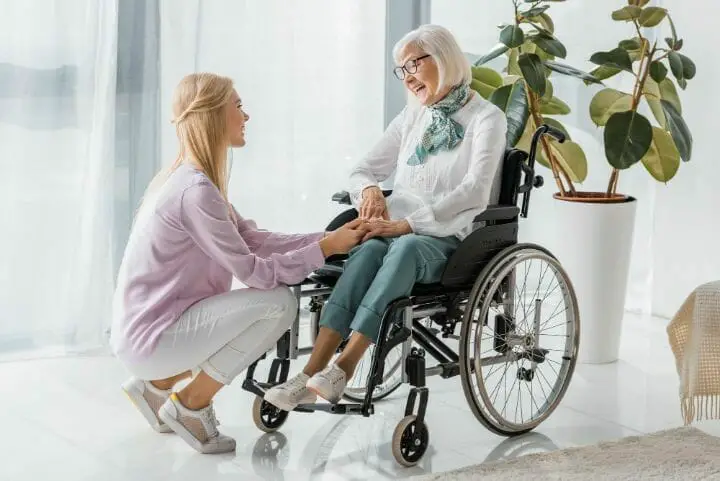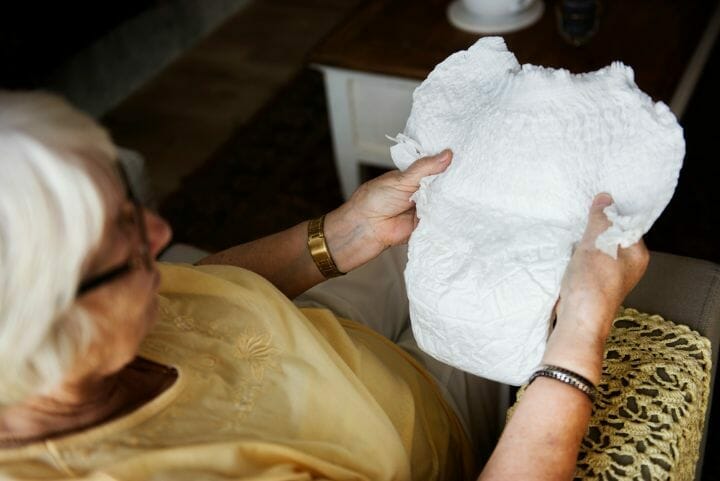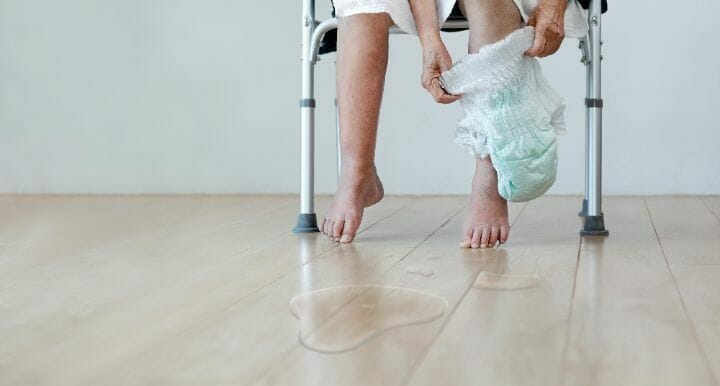As our parents age, they may start to struggle with aspects of their health and hygiene that they can’t take care of themselves and can’t discuss openly with others. The inability to hold their bladder and elderly incontinence is one such pertinent issue.
No one wants to think of their parents walking around, living their daily life, knowing they are having accidents or are unable to get to the bathroom in time.
Adult diapers and absorbent underwear are a great tool to help take care of bathroom accidents. They can easily be changed and thrown away when it does happen so that your parents aren’t dealing with soiled clothing all the time.
The problem, often, is that elderly parents often don’t want to wear them as they feel like it’s taking away their independence and like they can’t take care of themselves.
So, when the time comes how do you have the conversation with your aging parent that it might be time to start using adult diapers for their own personal hygiene?
Contents
Don’t Call Them Diapers
We all know that’s what they are, but the word diaper seems to carry negative associations for the elderly. Diapers are usually associated with babies and toddlers who are not yet toilet trained or can’t be trusted to know when they have to use the bathroom. So it is understandable why your parent wouldn’t be too happy about being told they need to start using diapers.
For example – many middle-aged women who have had children have stress incontinence. Stress incontinence is, for example, when you cough or sneeze, you may urinate a little. Oftentimes they will use a panty liner to protect from this. If your partner or children went around saying you used a diaper for this, how would you react?
Men might also use incontinence pads to prevent urine leakage. It is a good idea to be aware that the way you refer to the incontinence product being used by your parent, might change their perception of it.
So while you may struggle to find the right word or term to describe this new stage in your parent’s life, the wording you use when you have this conversation is going to be very important.
For your mom, using a term like pads or liners may be much more comfortable for them as this is a product they are used to using for a large part of their life.
For your dad, if it’s needed, he may respond well to just calling them briefs or underpants.
The bottom line is that no matter what terms you use when you have this conversation, being respectful will get you much further than just demanding that your parent starts to wear adult diapers.
Being respectful towards your parent during this conversation will be the first step in helping them with handling the incontinence they are living with as chances are your parent already knows it’s happening and they are embarrassed about it on their own.
Boost Their Self-Esteem
This might seem weird to think about, but having incontinence can really inhibit anyone from doing the things they enjoy the most and that can lower their self-esteem and self-confidence.
By wearing these briefs, they may be able to go out and to the things they used to love doing without worrying about having an accident. Discuss with your parent how this tool can help give them back some freedom and independence.
Yes, they may have to pack an extra pair or two for when they are out of the house but think about how much extra life that gives as opposed to having to come home and completely leave an activity if an accident happens.
You may also like Best Heavy Duty Disposable and Washable Bed Pads
Be Prepared For Denial
Your parent may still have complete cognitive function, but they are dealing with incontinence so they are likely very aware of the situation and are embarrassed about it.
If that’s the case, you may be able to appeal to their sense of vanity. No one wants to get older and much of our culture is based around doing everything we can to stop the aging process.
There are many incontinence products available that feel like the regular underwear anyone would wear on a regular basis, anyways, so they won’t have that extra bulky feel that so many people associate with wearing a diaper.
Incontinence is going to be difficult for anyone to accept – no matter how old they are or what the reason for it is – so this is never going to be an easy conversation to have.
However, if someone was to tell your parent – either you or an outside caregiver – that smelling like urine or sitting in soiled clothing all day is far more embarrassing than wearing a liner or appropriate protection then you might make some progress son this conversation.
Make Sure They Know They Aren’t Alone
Once you have had this conversation with your parent and they are coming around to the idea that they need some extra protection, they might feel really embarrassed or shy about the issue. Make sure they know that they aren’t alone and that you’re there for them.
What you can do is talk to them about the products available out there for them, and show them that you are there to work with them to find the right option for them.
Tell them you will help them find the most comfortable one for them that is low-profile and not bulky so that they can maintain their dignity and ensure they can still go out and enjoy the activities they did before.
You may also like Bedwetting Alarms for Seniors and Children
Talk to a Doctor
You may not feel totally comfortable having these discussions with your parent, or maybe you have had these discussions but your mom or dad is still very much in denial about what is going on.
Now a doctor, or any other third-party caregiver, may be able to help with talking to your parent. This might be hurtful, but let’s remember that the end goal is keeping your parent healthy and ensuring they are able to keep up with their own hygiene.
Seniors are more likely to ignore the suggestions of their loved ones and listen to those made by doctors or other healthcare professionals. Receiving advice from their adult children, when these adult children have no idea what they’re going through, can make a parent feel defensive and dismissive.
If you have tried a couple of times to talk to your parent about wearing appropriate incontinence protection but it hasn’t exactly worked out or they are in denial, it may be time to chat to their doctor and ask for help.
Additionally, it may feel less embarrassing for your parent to have this conversation with an objective doctor rather than it coming from someone they love. They trust that their doctor has the experience and has seen so many different situations that they may have more confidence when it’s coming from a doctor and not from their family.
Try to Find the Cause of the Incontinence
Changing the terms and being respectful isn’t going to change the fact that your parent is dealing with incontinence, so you can’t just have a nice little talk and all is well.
The incontinence may be coming from an underlying health issue that needs to be dealt with – especially if the incontinence is sudden and something that they haven’t had before.
After having the conversation with your parent about what is happening and that they need to wear a pad or liner, it will be important to book an appointment with your parent’s doctor to see if there is something else going on.
It could be something as simple as a UTI (urinary tract infection) or OAB (over active bladder) and their doctor can put together a care plan for rectifying the issue.
In some rare cases, it could be a prostate issue with men or pelvic organ prolapse in women. Of course, the doctor will run the appropriate tests to determine if there is another underlying cause to the incontinence happening.
If the cause is a UTI, some medication can fix the problem and the adult diapers may be temporary once the issue is fixed.
You may also like Best Diapers For Bedridden Patients
Incontinence and the Elderly – Parting Words
When talking to your parent about incontinence, you know that you have the best intentions and that you only want to make sure your parent stays healthy and well for as long as possible.
Your parent may be dismissive and defensive at first because they don’t want to admit it’s happening or they may know about it and feel really uncomfortable about it. By keeping their feelings in mind and respecting that this is going to be difficult for them – as is aging in general – you may be able to have an open and honest conversation about what’s going on and how you can mitigate it.
Talking to your parent about incontinence protection is never going to be an easy talk so if you’re having trouble with it, bringing a doctor or another caregiver in to help may move the conversation further along than if you just tack it on your own.
If you have questions about how to talk to your parent about wearing protection for their own health you can call their doctor or a home care worker to ask them for tips on how to approach it or even to be present for support during the conversation. You will get through this and you will help your parent as best you can. If the conversation fails, it may take some time before your loved one realizes there is an issue and fixes it. Be as supportive as you possibly can be and be there for them.




